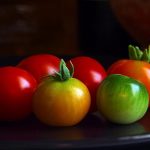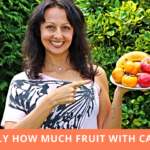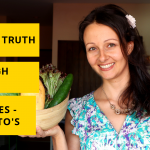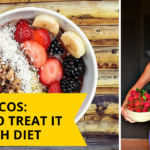by Paul Tarbath
Unfortunately, in today’s world it appears we all take a chance with our health to some degree when we consume conventional fruits and vegetables and even organic produce, which might not be as safe as many of us have been led to believe.
A very useful US based website can be found at the following link, which goes into detail about which chemicals can potentially be found on the type of produce you buy and their possible harmful effects to your health. http://www.whatsonmyfood.org/index.j
Nutrient Studies
Below are two significant studies carried out on organic and conventional produce, with regards to compared nutrient values, with the Stanford study also looking at the chemical contamination of produce.
Stanford University USA 2012
A new study from the Stanford University in the US has concluded quote: “The review yielded scant evidence that conventional foods posed greater health risks than organic products. While researchers found that organic produce had a 30% lower risk of pesticide contamination than conventional fruits and vegetables, organic foods are not necessarily 100 % free of pesticides. What’s more, as the researchers noted, the pesticide levels of all foods generally fell within the allowable safety limits. Two studies of children consuming organic and conventional diets did find lower levels of pesticide residues in the urine of children on organic diets, though the significance of these findings on child health is unclear.(1)
No consistent differences were seen in the vitamin content of organic products, and only one nutrient — phosphorus — was significantly higher in organic versus conventionally grown produce (and the researchers note that because few people have phosphorous deficiency, this has little clinical significance)”.(1)
The fact that any of the organic produce would have even just a 30% lower risk of pesticide contamination, compared to the conventional produce, would be enough to make many people wonder if buying organic is truly safe. Further to this, Smith-Spangler, who was connected with the study said [quote]: “What I learned is there’s a lot of variation between farming practices. It appears there are a lot of different factors that are important in predicting nutritional quality and harms”. (1) Again, the importance of knowing where your fruits and vegetables come from and how they are produced (organic or conventional) must always be a priority, if at all possible when you do your shopping.
European studies 2007
In 2007, scientists from Poland, France and Great Britain, examined organic apples, peaches, potatoes and carrots and discovered that there were greater concentrations of vitamin C and other chemicals that protect against heart attacks and cancer than produce that was non-organic. They also found that organic tomatoes had more vitamin C, flavonoids and beta-carotene.
The French part of the study looked at organic peaches and found that the content of polyphenol was higher at harvest and concluded that organic production had positive effects on both the taste and quality of the produce. Similar results were also seen by researchers from the Warsaw Agriculture University with organic tomatoes.
"This research shows there are benefits," said Dr Kirsten Brandt of Newcastle University, which led the research. "The reason why it’s such a grey area is because it’s extremely difficult to measure the health benefit in any food, but we can say that if you eat 400g of fruit and vegetables per day you would get 20 per cent more nutrients in organic food." (2)
Conclusions
Even though some studies appear to show that the difference in nutrient content between organic and non-organic can be quite small, (1), it must be stressed that crop production under the organic umbrella can differ greatly from industrialised-like farming methods right down to small holdings/large gardens with owners able to pay closer attention to the quality of the produce (including taste), rather than simply focusing on quantity.
If a good organic source can be located then there is no reason why the nutrient content should not be significantly more than what would normally be able to be attained with buying conventionally grown produce.
Take into consideration all the other wider benefits that organic farming has to offer us (see ‘The benefits of organic agriculture in a nut shell’ in part 1 of this article) and it becomes abundantly clear as to where our money should be spent, whenever possible. The study, detailed in part 1 of this article (3) showing higher than recommended pesticide levels in young children underlines the serious situation we face and not just with conventional grown produce, but also organic (4,5,6) Even though it appears to be significantly less of an issue; a 30% lower risk of pesticide contamination (1) it definitely does not equate to organic produce as being ‘chemical free, which it is believed to be by many consumers.
So when buying organic, make sure to ask about how the produce was grown, what type of fertilisers and/or pesticides were used if any, what general practices does the farmer/grower follow? They should be more than happy to share with you their practices as we have always found ourselves when visiting organic produce markets both in the US and Britain.
You can sometimes come across growers at markets who may not be certified as organic and cannot by law label their produce as such, but who actually use farming practices that follow the organic doctrine, and in some cases, improve upon it! Again it is worth talking to the growers and finding out exactly what they use on their produce!
So our recommendations would be
- Buy organic whenever you can.
- If at all possible grow your own.
- Inform yourself about produce growing practices and ask the growers the relevant questions such as: “What fertilisers and pesticides, if any do you use?”
- Use ‘Veg wash’ or grapefruit seed extract, which are supposed to help remove pesticide residues, if you need to.
- Minimizing your risk of exposure to chemical residues must be a priority as there aren’t safe levels of toxic chemicals, even if government bodies tell us differently.
Cutting back consumption of fruits and vegetables is never a solution to minimizing exposure to chemical residues and is a false economy in the long run. Seek produce that you know to be of high organic quality by doing your research and talk to the growers whenever possible.
Click here for part 1 of this article.
Bibliography
(1) http://med.stanford.edu/ism/2012/september/organic.html
(2) http://www.independent.co.uk/environment/green-living/its-not-just-a-fad–organic-food-is-better-for-you-say-scientists-443086.html
(3) http://www.ehjournal.net/content/11/1/83/abstract
(4) Panov, A., S. Dikalov, N. Shalbuyeva, G. Taylor, T. Sherer and J. T. Greenamyre. 2005. Rotenone model of Parkinson disease: multiple brain mitochondria dysfunctions after short term systemic rotenone intoxication. J. Biol. Chem. 280: 42026-42035
(5) Marking, L. L. and T. D. Bills. 1976. Toxicity of rotenone to fish in standardized laboratory tests. U. S. Dept. Interior, No. 72. 11 pp.
(6) Lotter, D. (2003). "Organic Agriculture". Journal of Sustainable Agriculture 21








